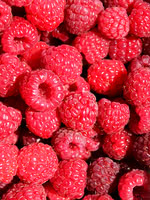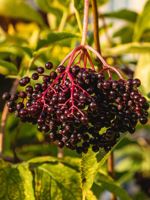Mon-Fri 9am - 5pm Mountain time
Killarney Raspberry vs Bob Gordon Elderberry
Rubus x Killarney
Sambucus canadensis Bob Gordon
Killarney Raspberry is extremely robust, with some of the best cold and disease resistance available. This could be due, in part, to it being bred in Manitoba.
It is also known for its good flavor and for being firmer than other varieties, which lends to its use in processing like pies, jams, and jellies or for U-Picks.
Killarney Raspberry is a floricane-fruiting variety, meaning it primarily produces fruit on second-year canes (previous season’s new growth). They are also referred to as summer-bearing. In late winter or early spring, cut back all spent floricanes, leaving only last season's canes.
Raspberries are self-fertile, meaning they do not require cross-pollination from another variety to produce fruit.
Bob Gordon Elderberry is a Black Elderberry cultivar that produces berries that are larger and sweeter than other varieties, making it one of the top cultivars. It produces large clusters of white flowers that turn into large clusters of dark purple to black berries. The berries are well-suited for baked goods, jams, jellies, and syrups. It was selected from the wild in Missouri.
The large berry clusters that the Bob Gordon Elderberry produces will often end up hanging downward. This makes it more difficult for birds to feed on the berries. If birds are a concern, this might be the right berry for you.
Black Elderberries are considered to be partially self-pollinating. So while they will still produce some berries without cross-pollination, planting with another variety will increase yields. Consider planting with Black Elderberry or Ranch Elderberry.
Warning: the seeds, stems, leaves, roots, and uncooked berries are toxic to humans when eaten in quantity. Berries should be cooked to make them safe for human consumption.
Killarney Raspberry Quick Facts
Bob Gordon Elderberry Quick Facts
Toxicity: leaves, stems, and uncooked berries are poisonous to humans

